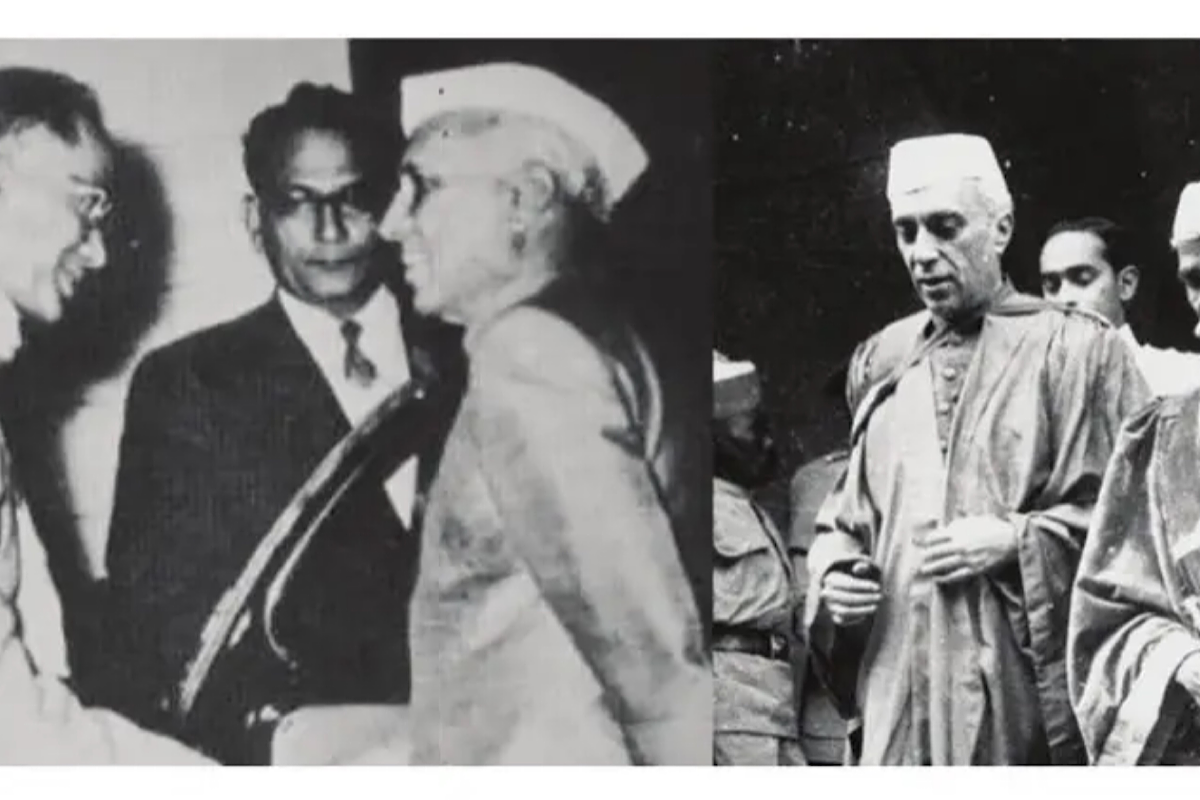“So this is how you wish to treat a democratic revolution in a neighbouring state! … You are destroying yourself. One by one you are denying your noble ideals. You are compromising, you are yielding. You are estranging your friends and slipping into the parlour of your enemies … And please learn to discipline your temper.”
These angry words were written by Jayaprakash Narayan to Prime Minister Jawaharlal Nehru on 17 November 1950. The occasion for this heated exchange was a crisis in Nepal when the King of Nepal took refuge in the Indian Embassy and was later flown out to Delhi. Pandit Nehru’s policy was to compel Nepal Congress leadership to make constitutional changes, usher in political reforms and receive the King back.
Advertisement
He declined to provide military support from India against the King. In his reply to Jayaprakash Narayan, Pt Nehru wrote, calmly without losing his temper, “I am distressed at the lack of understanding that you have shown and I am more than distressed by the astonishing stupidity of some of the things leaders of Nepal Congress have been responsible for… I quite agree with you that the opportunity of securing freedom for Nepal has come and that the trump cards are there.
When I see this opportunity being almost lost and every kind of bungling being done by amateur politicians who know nothing about politics and less about insurrection, I have a right to be upset… Widespread propaganda is being carried on by our opponents to show this is just an example of Indian imperialism and that we have engineered all this. This obviously can do a great deal of harm to the whole movement.”
In volume two of Nehru’s biography, meticulously written by S. Gopal, it is clear domestic pressures on the Prime Minister were growing with every passing year. By March 1948, Communists had launched militant mass movements which appeared to Pt Nehru to ‘have developed into an anti-national campaign’, worse than an open rebellion and aiming at total disruption across Telangana in Hyderabad, Travancore-Cochin, Tripura, Manipur, Malabar in Madras, Andhra and parts of west Bengal, Bihar, eastern Uttar Pradesh and Maharashtra. Nehru did not mince his words and wrote, “I have not the least feeling against communism or against communists as such … the British Tory press often describes me as a pal of Stalin.
But I must confess that the way the communists are carrying on in India in the shape of the most violent activity and writing is enough to disgust anyone. There is a complete lack of integrity and decency.” The Congress Socialist Party had been formed in 1948; Pt Nehru was distressed that Jayaprakash Narayan, Acharya Narendra Deva, and leaders whom he valued, had been lost to the Congress, making him experience political isolation specially soon after Mahatma Gandhi’s assassination.
In those years, it was widely known Pt Nehru spoke highly of JP, as Jayaprakash Narayan was popularly known. S. Gopal notes “Nehru recognised his physical courage and moral integrity and even in 1946 had seen in him a future prime minister.” The American journalist Louis Fischer too cited the remark; it finds mention in Maulana Azad’s widely read chronicle, ‘India Wins Freedom’.
JP invariably referred to Pt Nehru, in his letters, as ‘Bhai’ or elder brother; Nehru was worried about the growing breach in their brotherhood. “Narayan was apt to go astray very often and act in an irresponsible manner. But he is one of the straightest and finest men I have known, and if character counts, as it does, he counts for a great deal. It seems to me a tragedy that a man like him should be thrust, by circumstances, into the wilderness,” wrote Nehru to Gobind Ballabh Pant, a Congress stalwart. Facing up to the barrage of criticism and angry words, the Prime Minister maintained his calm, still hoping the Socialists would make a return. S. Gopal’s biography notes that he advised his colleagues to say and do nothing which might add to the rift. In an effort to win Socialists back, he wrote to Jayaprakash offering to consider how the gulf could be bridged and requesting him to do the same.
“I am greatly distressed at many things in India. But perhaps what distresses me most is the wide gap which is ever growing between many of us and the Socialist Party,” wrote Nehru. Jayaprakash Narayan had been severely critical of Nehru’s general outlook. “You want to go towards socialism, but you want the capitalists to help in that. You want to build socialism with the help of capitalism. You are bound to fail in that.”
He ignored an appeal not to launch a railway strike and objected vehemently to the legislation outlawing strikes in the essential services, describing it as ‘an ugly example of growing Indian fascism’, in a telegram sent to Nehru in early 1949. Nehru shared a special bond with Acharya Narendra Deva, who is often hailed as the doyen of Indian socialism. Acharyaji and Nehru shared their imprisonment at Ahmednagar Fort jail in 1945 along with Sardar Patel, Maulana Abul Kalam Azad and Acharya Kripalani. Nehru acknowledged his debt to Acharya Narendra Deva’s encyclopaedic knowledge, his ability to build bridges between Marxist thought and Buddhist teachings. For Jayaprakash Narayan, Acharyaji was a mentor and guide. But JP immersed in Marxist thought was re-discovering the power of Gandhian thought and action.
To say that these political leaders were intellectual powerhouses, whose writings remain invaluable, is to state the obvious. “Is the Congress drifting away?” is a full-length article based on Acharya Narendra Deva’s speech published in National Herald, 5 May 1949 and 25 July 1949. The Lucknow-based newspaper was edited by M. Chalapathi Rau and enjoyed enviable editorial freedom, even though it was funded by the Congress since its inception in 1938. To quote from the National Herald, Acharyaji said, “The Congress is drifting away from the masses. It is afraid of the people and shows no respect for public opinion.
The Congress cannot tolerate opposition and is developing fascist tendencies. The argument of the Congress leaders that due to numerous unforeseen difficulties and problems they are not able to fulfil their declared objectives is not convincing. Almost every country in the world, except the USA, was hard hit as a result of the war. But the workers and peasants are nowhere so miserable as they are in India.”
“It is wrong to say that labourers hamper production by going on strikes,” he explained, adding, “the truth is that capitalists do not invest the necessary capital as they want to compel the government to accept their terms. Capitalists are responsible for the present low production. But the government are not taking strong measures against them. England sustained inconceivable loss in men, money and material during the last war. There were enormous difficulties and problems before the British Government. Even then much relief has been brought to the common man there.
There is cheap food and free medical aid in Britain.” Acharya Narendra Deva demonstrated his ability to be hard-hitting, critical and providing the explanation of why societal and industrial growth was being hampered. The Congress declared a classless society as its goal at the Jaipur session in December 1948. Holding the first Congress session after independence at Jaipur was of immense symbolic value. It represented the integration of erstwhile princely states. Acharya Narendra Deva was convinced “this was sheer propaganda to counteract the growing Left influences.
There was unrest all over the world, and old traditions, ideas and institutions are giving way. Capitalism has reached a stage when it cannot last long. On the one side there was an increase in the number of millionaires, on the other, the army of poor and unemployed is increasing at a rapid speed. The entire world is sitting on a volcano. No one knows what would happen tomorrow.
The world-shaking events are taking place in China, Burma and other places, heralding the advent of age. Socialism is the order of the day and it alone can rescue the diseased and distressed world,” his words leap out of the National Herald report. Acharyaji was unsparing when he said, “Sardar Patel says that they have no resources to nationalise industries, it becomes quite clear that they are incapable of implementing the socialist programme.
To put off the fundamental demands of workers is itself proof that the Congress aim of classless society has no shadow and substance.” Acharya Narendra Deva was Vice Chancellor of Lucknow University when he made this speech asking “What is the Congress today? There is a partisanship and grouping within the Congress. It is an organisation divided against itself. A mad race for power, office and money has taken the place of selfless service…Socialism cannot be ushered in with the help of government servants.”
(The writer is a writerresearcher on history and heritage issues, and former deputy curator of Pradhanmantri Sangharalaya)











